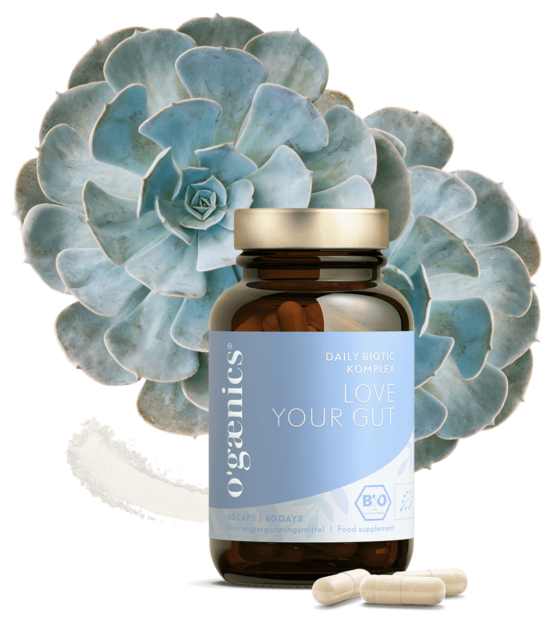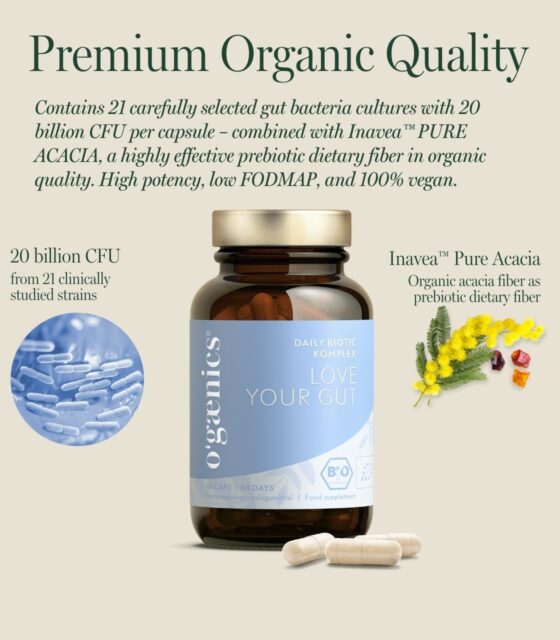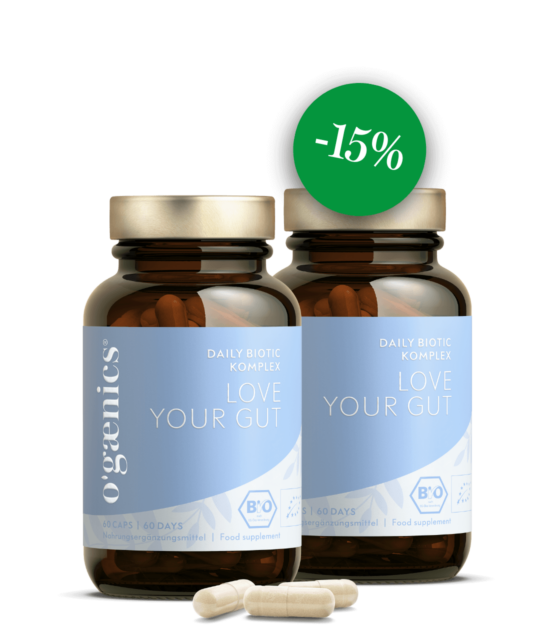We’ll give you some simple tips on how to find the best probiotic for you.
You probably already know how important your gut health is. It is the key to better digestion, better skin and a better mood.
Fermented foods such as kimchi, sauerkraut, kombucha and kefir can serve as a source of probiotic bacteria. However, if these foods are not your cup of tea, a probiotic food supplement may make sense.
But be careful with your choice. Because not every probiotic is the same, and the options on the market are overwhelming. We’ll help you understand the label and find the right probiotic for you.
What is a probiotic?
The naturally occurring beneficial bacteria that make up our microbiome are called probiotics. The World Health Organization (WHO) definition of a probiotic is “Probiotics are live microorganisms that, when administered in sufficient quantities, confer a health benefit on the host”(1).
In order for there to be a probiotic effect, the right strains must be consumed in sufficient, scientifically proven quantities. And they have to survive the many stages of digestion (past stomach acid and bile). This is where probiotic supplements come into play. 👉 What many people don’t know: Chronic stress can also severely disrupt the balance in the microbiome. You can read why this is the case – and how you can counteract it – here.
Incidentally, in Germany the term “probiotic” may not be used for food or food supplements. This is because, from the legislator’s point of view, it constitutes an unauthorized health claim. You will therefore not find the terms “probiotic” and “probiotic” on German food supplements.
Does it contain bifido- and lactobacilli?
The most common genera of bacteria are Lactobacilli, which live in the small intestine, and Bifidobacteria, which are more commonly found in the large intestine. Make sure that both types of bacteria are combined in your product. Thus, the entire intestinal tract can benefit from the probiotic.
Ensure a wide variety of microorganisms
The product should contain as many different bacterial strains of each species as possible. Each strain in the Proboticium promises different benefits for your health. A wide variety of bacterial strains living in your gut is good for your health.
If you want to know which strains help with acne or eczema, read our article “Are probiotics the key to better skin?”.
How many bacteria per capsule?
Choose a probiotic that guarantees 5-10 billion “colony forming units” (CFU) in one capsule. This allows it to have a good effect in the body and does not overload your system.
Is the probiotic free of sugar, allergens and additives?
Look critically at the ingredients list to make sure the probiotic does not contain sugar, which is often disguised as “maltodextrin”. It’s often used in cheaper brands to speed up the bacteria growth process, but it’s poison for your gut.
The product should also be free from any additives, as these can potentially disrupt the gastrointestinal tract and your hormonal system. Classic allergens such as milk/lactose or gluten should also not be included under any circumstances.
Are the bacteria protected against stomach acid?
For the bacteria to work, it is important that they arrive alive in the intestine. It is therefore essential to look for a probiotic that ensures this. Importantly, all strains included have been shown to have high survivability in the gastrointestinal tract. So have a natural resistance to gastric and biliary secretions.
Beware of enteric-coated capsules
Be careful with a probiotic in enteric-coated capsules. These are full of chemicals so that they can withstand the acidic environment in the stomach. At Ogaenics we do not use such capsules, because if the right bacterial strains are used, taking them on an empty stomach with a large glass of water is perfectly sufficient for the bacteria to reach the intestine undamaged.
Does the product work without cooling?
A modern probiotic such as the Ogaenics Love your Gut Daily Biotic Complex no longer needs to be kept in the fridge and is therefore also a perfect travel companion. However, always protect the capsules from too much light, heat and moisture so that they do not lose their effect.
Are the bacteria getting enough “food”?
Probiotic supplements that already contain prebiotics in a capsule, such as the Ogaenics Love your Gut Daily Biotic Complex, are ideal and extremely practical. This type of food supplement is also known as a synbiotic.
Which strains are included?
To say in advance: there are countless different strains. The effects of some of them have already been researched in various studies.
- The probiotic strains Lactobacillus rhamnosus, Saccharomyces boulardii, Lactobacillus casei and Lactobacillus acidophilus have been proven in studies for antibiotic reconstruction. You will find Lactobacillus rhamnosus in our Love Your Gut Daily Biotic Complex.
- Eczema with itchy, scaly skin rashes benefit from Lactobacillus rhamnosus and Lactobacillus fermentum. You will find these two strains in our Love Your Gut Daily Biotic Complex.
- The duration and severity of colds can be reduced by Bifidobacterium animalis lactis and Lactobacillus acidophilus. Lactobacillus acidophilus can be found in our Love Your Gut Daily Biotic Complex.
- Lactose intolerance can be alleviated by lactase-producing strains such as Lactobacillus acidophilus. You will find this probiotic in our Love Your Gut Daily Biotic Complex
- In the case of irritable bowel syndrome (IBS), Lactobacillus plantarum helps to regulate bowel movements and relieve bloating and pain. You can find this bacterium in our Love Your Gut Daily Biotic Complex(6).
- Vaginal infections such as bacterial vaginosis and urinary tract infections can be demonstrably prevented and eliminated by the strains Lactobacillus acidophilus, Lactobacillus rhamnosus and Lactobacillus reuteri. They are also the most effective strains to protect against yeast infections. You will find these three strains in our Love Your Gut Daily Biotic Complex. You can read more about this topic in this article: How to naturally prevent vaginal thrush in summer.
- Even obesity can be addressed by probiotic bacteria. In an 8-week treatment with Bifidobacterium breve BR03 and B632 had positive effects on insulin sensitivity in adolescents with obesity. You will find Bifidobacterium breve BR03 in our Love Your Gut Daily Biotic Complex.
- The positive effect on the cognitive functions of women was researched on the basis of Bifidobacterium Lactis BS01 and Lactobacillus Acidophilus LA02. Both strains can be found in the Love Your Gut Daily Biotic Complex.
- Covid -19 prophylaxis: Lactobacillus rhamnosus GG could help to prolong the time to COVID-19 infection, a lower incidence of disease symptoms when used as prophylaxis ≤7 days after COVID-19 exposure. Lactobaciullus rhamnosus GG is contained in the Love Your Gut Daily Biotic Complex.
- In cases of bacterial overgrowth of the stomach due to medication (proton pump inhibitors), the 14-day ingestion of four Lactobacilli L. rhamnosus LR06, L. pentosus LPS01, L. plantarum LP01, and L. delbrueckii subsp. delbrueckii LDD01effective. L. pentosus LPS01 and plantarum LP01 can be found in the Love Your Gut Daily Biotic Complex.
Conclusion
Your path to a healthy microbiome can be supported by the right choice of probiotic. Consider the above points to find a product that optimally promotes your intestinal health. Remember that a probiotic works not only through its strains, but also through their ability to reach the gut alive and provide a diversity of microorganisms. The Ogaenics Love Your Gut Daily Biotic Complex is an example of a well thought-out product that fulfills these criteria.
If you want to learn more about gut health, probiotics and the microbiome, read on here:
- How menopause affects your gut health
- Skin problems? The gut-skin axis is behind it
- The crucial role of the microbiome for gut health
- Irritable bowel syndrome: Vitamin D can banish flatulence
- How the microbiome influences our health and ageing
- Bloated belly while traveling: how to prevent it
- What can I expect when I take probiotics?
- Optimize your gut health with synbiotics
- What is gluten and why is it bad for some people?
- What is turmeric actually good for?
Store the Story
-
Bestseller
Love Your Gut
Bio Daily Biotic Complex Premium for the gut: 21 bacterial strains plus organic fiberab 39,90 € -
Set 2x Love Your Gut | Daily Biotic Complex
2-pack (=4-month supply) Bio Daily Biotic Complex Premium for the gut: 21 bacterial strains plus organic fiber118,90 €139,80 €4.660,00 €3.963,33 € / kg
“The use of probiotics in healthy volunteers with evacuation disorders and hard stools. A double blind, randomized, placebo-controlled study”
Del Piano, M., et al, J Clin Gastroenterol, (2010) 44(8): S30-34
“Probiotics as a Novel Adjuvant Approach to Atopic Dermatitis”
Manzotti, G., Journal of Contemporary Immunology. (2014) Vol. 1 No. 2 pp. 57-66
“A new chance of preventing winter diseases by the administration of synbiotic formulations”
Pregliasco, F. et al, J Clin Gastroenterol, (2008) Sep;42 Suppl 3 Pt 2:S224-33.
“Probiotics and antibiotic-associated diarrhea in children: A review and new evidence on Lactobacillus rhamnosus GG during and after antibiotic treatment”
Mantegazzaa, C. et al, Pharmacol Res. (2018) Feb;128:63-72.
“Probiotics in the Treatment of Inflammatory Bowel Disease in Adulthood: A Systematic Review. ” Lorentz A, Müller L. , J Gastrointestin Liver Dis. 2022 Mar 19;31(1):74-84. doi: 10.15403/jgld-3936
“Supplementation with Bifidobacterium breve BR03 and B632 strains improved insulin sensitivity in children and adolescents with obesity in a cross-over, randomized double-blind placebo-controlled trial.”
Solito, Arianna et al. Clinical nutrition (Edinburgh, Scotland) vol. 40,7 (2021): 4585-4594. doi:10.1016/j.clnu.2021.06.002
“Effects of Bifidobacterium Lactis BS01 and Lactobacillus Acidophilus LA02 on cognitive functioning in healthy women.”
Czajeczny, Dominik et al. Applied neuropsychology. Adult vol. 30,5 (2023): 552-560. doi:10.1080/23279095.2021.1967155
“Efficacy of probiotic treatment as post-exposure prophylaxis for COVID-19: A double-blind, Placebo-Controlled Randomized trial.”
Wischmeyer, Paul E et al. Clinical nutrition (Edinburgh, Scotland) vol. 43,1 (2024): 259-267. doi:10.1016/j.clnu.2023.11.043
“Correlation between chronic treatment with proton pump inhibitors and bacterial overgrowth in the stomach: any possible beneficial role for selected lactobacilli?”
Del Piano, Mario et al. Journal of clinical gastroenterology vol. 48 Suppl 1 (2014): S40-6. doi:10.1097/MCG.0000000000000256





 No products in the cart.
No products in the cart.